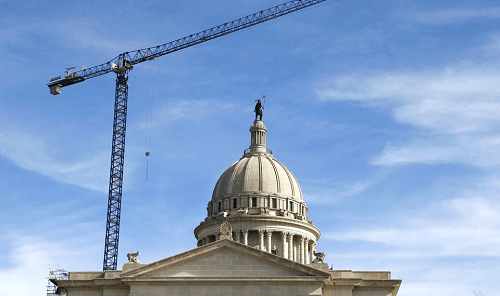
6.30.20 -The Oklahoman BY CARMEN FORMAN
Oklahoma poll workers will get a pay bump in the new fiscal year. State law requires three workers for each polling location — an inspector, judge and clerk — with each paid between $85 and $95. Under a new law, judges and clerks will be paid $100 and inspectors will be paid $110 for working on Election Day.
Roughly two dozen new state laws will take effect in Oklahoma on Wednesday.
Here’s a look at some of the new laws.
Cost-of-living adjustments
For the first time in 12 years, most state retirees will see a cost-of-living adjustment in their pension checks.
Starting Wednesday, state retirees who have been retired for more than five years will see a 4% increase in their pensions. Those who have been retired for between two and five years will see a 2% increase. Those retired for less than two years will not see an increase.
The cost-of-living adjustments, which will be paid out of state pension funds, are expected to have a $767 million lifetime impact on the state’s pension systems. The adjustments apply to retirees in five of the seven state pension systems.
Corrections employee pay raises
About 430 state corrections employees who were accidentally left out of pay raises last year will receive $2-per-hour raises starting July 1.
A new law attempts to fix an oversight that unintentionally kept the corrections employees from receiving pay raises last year due to a classification error.
The pay raises will cost the state about $1.6 million annually.
Pay raises for poll workers
Oklahoma poll workers will get a pay bump in the new fiscal year.FROM THE HOMEPAGE‘Abolitionist’ candidates largely unsuccessful in legislative racesNEWSUpdated: 18 hours ago
State law requires three workers for each polling location — an inspector, judge and clerk — with each paid between $85 and $95. Under a new law, judges and clerks will be paid $100 and inspectors will be paid $110 for working on Election Day.
The new law law also restructures the framework of some election boards and requires proposed changes to precinct boundaries to be presented at a public meeting and approved by the county election board.
Judicial pay raises
Oklahoma judges across all levels will see 4.5% pay raises.
The pay raises are less than the 9.2% pay raises recommended by the Board on Judicial Compensation, which makes recommendations for salary adjustments every two years.
District attorneys, whose pay is tied to judicial compensation, will also see similar pay raises later this year.
Virtual charter school reforms
The Virtual Charter School Transparency and Reform Act will implement a host of changes to virtual charter schools, including new policy for transfers, attendance and truancy.FROM THE HOMEPAGECoronavirus in Oklahoma: Restaurants continue to adjust to public health demandsHEALTHUpdated: 2 days ago
Oklahoma’s state schools superintendent has praised the law as a “strong step in the right direction for transparency and accountability among our virtual charter schools.”
Starting with the 2021-2022 school year, the law will limit public-school students to only one transfer a year to a virtual charter school.
The virtual school would pre-enroll a student whose parents express interest in transferring their child. The state Education Department would initiate the transfer upon pre-enrollment, giving the student’s resident school district three days to send the child’s vital records. The measure also increases the number of instructional activities required for virtual charter students to be considered in attendance.
Students would be withdrawn for truancy if they failed to complete any activities or assignments for a 15-day period without an excuse. A student who is reported for truancy two times in a school year would be withdrawn and prohibited from re-enrolling in the virtual charter school.
Current law includes no prohibition against students re-enrolling in a virtual charter school.
School sports safety
Following the death of a Lexington middle school athlete last year, Oklahoma school districts will be required to provide emergency medical services at school athletic events and other activities.
School districts will be required to coordinate with emergency medical service providers to develop plans to provide emergency medical services. The plans will have to be reviewed and updated annually.
The Riley Boatwright Act, passed by Rep. Sherrie Conley, R-Newcastle, and Sen. Rob Standridge, R-Norman, is named after a Lexington teen who died after playing in a middle school football game.
Teaching certificates
The State Board of Education will make it easier for teachers licensed in other states to teach in Oklahoma.
A new law, from Sen. Adam Pugh, R-Edmond, requires the Board of Education to issue a teaching certificate to anyone who holds a valid out-of-state teaching certificate so long as the person passes a criminal history record check.
Local grocery stores
As Oklahoma City grapples with a food desert in the northeast part of the city, a new law will allow local governments to become more financially involved in attracting grocery stores to low-income areas or places that lack access to healthy food.
Local governments will essentially be able to offer state local government matching payments to help bring in grocery or specialty food stores within one-half mile of a low-income or low-access areas
Improving access to food and groceries in northeast Oklahoma City has long been a topic of discussion, but conversations intensified last year when the only grocery store in the area abruptly closed last summer.
Carryover education funds
A new law by Rep. Chad Caldwell, R-Enid, will prevent school districts from being penalized for having excess carryover funds this year due to the COVID-19 pandemic.
Typically, if a district exceeds limits placed in statute multiple years in a row, the State Department of Education can assess a penalty.
But many districts are seeing larger carryover funds than normal due to decreased transportation or utilities costs because of the schooling changes brought on by the pandemic, Caldwell said.
